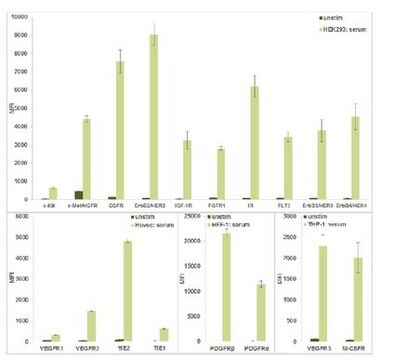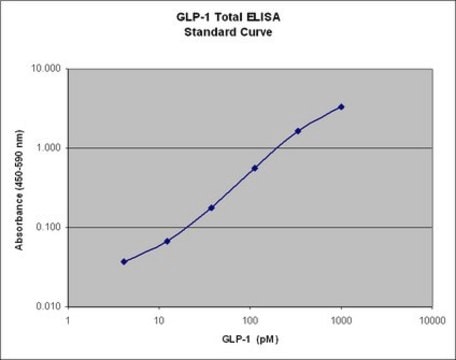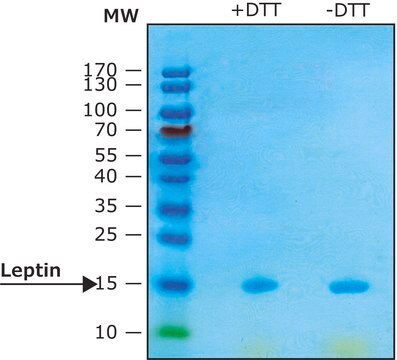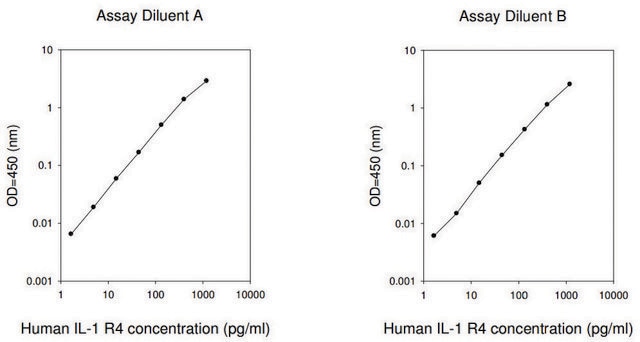RAB0978
Phosphotyrosine CSF1R / Macrophage Colony-stimulating Factor 1 Receptor ELISA Kit
Sign Into View Organizational & Contract Pricing
All Photos(1)
About This Item
UNSPSC Code:
41116158
NACRES:
NA.32
Recommended Products
species reactivity
human
technique(s)
ELISA: suitable
assay range
inter-assay cv: <10%
intra-assay cv: <12%
shipped in
wet ice
storage temp.
−20°C
Gene Information
human ... CSF1R(1436)
General description
CSF1R (colony stimulating factor 1 receptor) or FMS, acts as a receptor for CSF1 and regulates monocyte and macrophage functioning. It is a member of the platelet-derived growth factor (PDGF) family of proteins and is a type III RTK (receptor tyrosine kinase). CSF1R is composed of five immunoglobulin (Ig)-like domains, a transmembrane region, a juxtamembrane domain and kinase insert domain (KID) intersecting the kinase domain.
The antibody pair provided in this kit recognizes Human Tyrosine-Phosphorylated-MCSFR.
Application
For research use only. Not for use in diagnostic procedures.
Please refer to the attached General ELISA KIT Procedure (sandwich, competitive & Indirect ELISA)
Please refer to the attached General ELISA KIT Procedure (sandwich, competitive & Indirect ELISA)
Biochem/physiol Actions
CSF1R (colony stimulating factor 1 receptor) and its ligand CSF1 are linked to poor prognosis in patients with solid tumors and in patients with female reproductive cancers. In breast cancers with decreased claudin levels, this protein regulates the switch between proliferative and invasive state of the tumor, acting downstream of TGFβ (tumor growth factor β). Haploinsufficiency in this receptor might lead to aberration of microglial function, which might be a contributor to the pathogenesis of hereditary diffuse leukoencephalopathy with spheroids (HDLS).
Kit Components Also Available Separately
Product No.
Description
SDS
- RABHRP6Phosphotyrosine ELISA HRP-StreptavidinSDS
Signal Word
Warning
Hazard Statements
Precautionary Statements
Hazard Classifications
Met. Corr. 1
Storage Class Code
8A - Combustible corrosive hazardous materials
Flash Point(F)
Not applicable
Flash Point(C)
Not applicable
Certificates of Analysis (COA)
Search for Certificates of Analysis (COA) by entering the products Lot/Batch Number. Lot and Batch Numbers can be found on a product’s label following the words ‘Lot’ or ‘Batch’.
Already Own This Product?
Find documentation for the products that you have recently purchased in the Document Library.
CSF1R mutations in hereditary diffuse leukoencephalopathy with spheroids are loss of function.
Pridans C, et al.
Scientific Reports, (3), 3013-3013 (2013)
Takuya Konno et al.
Neurology, 82(2), 139-148 (2013-12-18)
To clarify the genetic, clinicopathologic, and neuroimaging characteristics of patients with hereditary diffuse leukoencephalopathy with spheroids (HDLS) with the colony stimulating factor 1 receptor (CSF-1R) mutation. We performed molecular genetic analysis of CSF-1R in patients with HDLS. Detailed clinical and
A Patsialou et al.
Oncogene, 34(21), 2721-2731 (2014-08-05)
Patient data suggest that colony-stimulating factor-1 (CSF1) and its receptor (CSF1R) have critical roles during breast cancer progression. We have previously shown that in human breast tumors expressing both CSF1 and CSF1R, invasion in vivo is dependent both on a
Parag P Patwardhan et al.
Clinical cancer research : an official journal of the American Association for Cancer Research, 20(12), 3146-3158 (2014-04-11)
Malignant peripheral nerve sheath tumor (MPNST) is a highly aggressive tumor type that is resistant to chemotherapy and there are no effective therapies. MPNSTs have been shown to have gene amplification for receptor tyrosine kinases (RTK), PDGFR and c-Kit. We
V Barbetti et al.
Oncogene, 33(34), 4359-4364 (2013-12-24)
The colony-stimulating factor-1 (CSF-1) and its receptor CSF-1R physiologically regulate the monocyte/macrophage system, trophoblast implantation and breast development. An abnormal CSF-1R expression has been documented in several human epithelial tumors, including breast carcinomas. We recently demonstrated that CSF-1/CSF-1R signaling drives
Our team of scientists has experience in all areas of research including Life Science, Material Science, Chemical Synthesis, Chromatography, Analytical and many others.
Contact Technical Service









